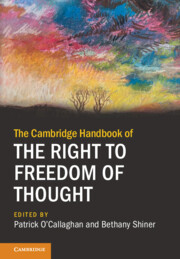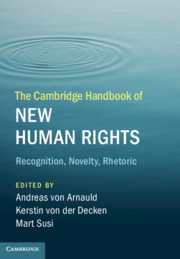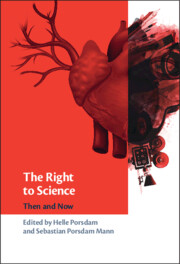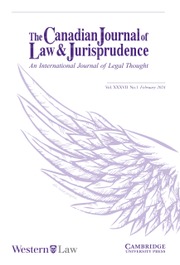The Cambridge Handbook of the Right to Freedom of Thought
The right to freedom of thought features prominently in debates about emerging technologies including neurotechnology and AI, but there is little understanding of its scope, content or application. This handbook presents the first attempt to set out how the right is protected, interpreted and applied globally. Eighteen jurisdictions are examined along with chapters describing context-setting, interdisciplinary approaches, and close analysis of the right in relation to specific challenges and conceptual difficulties. Readers familiar with the right will discover fresh perspectives and those new to the right will learn how it is part of the matrix of rights protecting autonomy, dignity, and privacy.
- Provides new analyses of how legal systems recognise and seek to safeguard freedom of thought
- Containing analysis of eighteen jurisdictions across four regions, it provides a richer understanding of the right including how it is protected, and why
- Contextualises recent discussions around the scope, content and application of the right to freedom of thought
Reviews & endorsements
‘A remarkable intellectual effort to provide legal solutions to how freedom of thought can be better protected. Essential reading for any legal scholar interested in how rapid technological advances can interfere with the most intimate and until now unfathomable sphere of the individual: the mind. This collective work presents some of the most controversial issues that should be urgently answered by legal doctrine and practitioners to better assess where human rights risks may emerge in this context and how violations can manifest and be prevented. For all those advocating for the effective enjoyment of free and independent thinking, this handbook is certainly a must.’ Milena Costas Trascasas, Member of the United Nations Human Rights Council’s Advisory Committee and Rapporteur of the Study on Neurotechnology and Human Rights submitted to the UNHRC in September 2024
‘It is an astonishing achievement to have brought such a diverse range of scholars from so many different parts of the world together in one volume to address freedom of thought - a topic of increasing significance given recent technological advancements. In one book, the editors and contributors have moved the scholarly literature on this erstwhile neglected right to a place where there is now a very good basis for the careful consideration and development of the right to freedom of thought that is urgently needed.’ Allan McCay, Co-director of The Sydney Institute of Criminology, Academic Fellow at the University of Sydney Law School, and President of the Centre for Neurotechnology and Law
‘This is an unprecedented academic work in the fields of human rights and constitutional law. It contains a truly global comparative approach to freedom of thought. It offers readers a complete panoramic view on the origins and the evolution of this right all around the world. Furthermore, it presents, and provides answers to, the most challenging questions about freedom of thought in times of neuroscience, artificial intelligence and the digital age. This work will rapidly become canonical for academics, judges and practitioners, both in international systems for the protection of human rights and in domestic legal systems. Beyond any question, this handbook represents a renaissance of freedom of thought in legal fields and political science globally.’ Humberto Sierra Porto, ex-President of the Interamerican Court of Human Rights and ex-President of the Constitutional Court of Colombia
‘This is a pathbreaking work on a founding right that has received little attention. The in-depth scholarly treatment in the handbook seeks to fill the content of the right while also making a normative case for taking this right seriously. This is a compelling work of careful consideration which is sensitive to social, historical and legal context, as evidenced from contributions beyond the transatlantic scholarship. Truly a tour de force in thought scholarship!’ Srikrishna Deva Rao, Vice Chancellor, NALSAR University of Law, Hyderabad
‘This rich collection of essays represents a remarkable intellectual accomplishment. The diversity of the contributing authors, as well as the breadth and depth of the analyses, ensures that key issues relating to the right to freedom of thought are thoroughly interrogated. The simplicity of delivery across the chapters also makes the book’s central findings easily comprehensible and accessible. Accomplished scholars will certainly find the handbook relevant, as will those newly embarking on the task of understanding the parameters of and the nuances within the right. In true handbook fashion, this book will remain a foundational resource for anyone dealing with the right to freedom of thought.’ Mwiza Jo Nkhata, Honorary Professor, University of South Africa, and Principal Legal Officer, African Court on Human and Peoples’ Rights
Product details
April 2025Adobe eBook Reader
9781009539623
0 pages
Not yet published - available from April 2025
Table of Contents
- Part I. Introduction:
- 1. Introduction: mapping and implementing legal protection of the right to freedom of thought Patrick O'Callaghan and Bethany Shiner
- 2. 'The mind and conscience are the person's most sacred possessions': the origins of freedom of thought in the universal declaration of human rights and the International Covenant on Civil and Political Rights Christoph Bublitz
- Part II. Asia:
- 3. The right to freedom of thought in Japan Satoshi Yokodaido
- 4. The right to freedom of thought in China Heping Dang
- 5. The right to freedom of thought in Vietnam Giao Vu Cong
- 6. The right to freedom of thought in Malaysia Kalpana Sivabalah
- 7. The right to freedom of thought in India Kelly Amal Dhru
- Part III. Europe:
- 8. The right to freedom of thought in Türkiye Emine Ozge Yildirim-Vranckaert
- 9. The right to freedom of thought in Germany Nora Hertz
- 10. The right to freedom of thought in France Marie-Luce Paris
- 11. The Right to Freedom of Thought in the United Kingdom Bethany Shiner
- 12. The right to freedom of thought under the European Convention on Human Rights Felicitas Benziger
- Part IV. Africa:
- 13. The Right to Freedom of Thought in Kenya Victoria Miyandazi, Miracle Mudeyi and Harrison Otieno Okoth
- 14. The right to freedom of thought in Zambia Christopher Phiri
- 15. The right to freedom of thought in Mauritius Neel Raamandarsingh Purmah
- 16. The right to freedom of thought in South Africa Mariette Jones
- 17. The right to freedom of thought in the African Charter on Human and Peoples' Rights Sfiso Bernard Nxumalo
- Part V. Americas:
- 18. The right to freedom of thought in Brazil Lucas Oliveira Vianna
- 19. The right to freedom of thought in Chile Eduardo A. Chia and Flavio Quezada
- 20. The right to freedom of thought in Colombia Diego González Medina and Sebastián Rubiano-Groot
- 21. The right to freedom of thought in the United States Marc Jonathan Blitz
- 22. The right to freedom of thought in Canada Dwight Newman
- 23. The right to freedom of thought under the American Convention on Human Rights Cláudio De Oliveira Santos Colnago and Bethany Shiner
- Part VI. The Right to Freedom of Thought in Context:
- 24. What is thought and what makes it free? Or, how I learnt to stop worrying and love the forum externum Simon Mccarthy-Jones and Joel Walmsley
- 25. Online manipulation as a potential interference with the right to freedom of thought Nina Keese and Mark R. Leiser
- 26. Neurorights: is the right to freedom of thought in need of an update? Timo Istace and Catherine Van De Heyning
- 27. Freedom of thought: absolute protection of mental privacy and mental integrity? Considering the case of neurotechnology in criminal justice Sjors Ligthart and Naomi Van De Pol
- 28. Realising the societal dimensions of the right to freedom of thought in the digital age through strategic litigation Kebene Wodajo
- 29. Non-ideal theory and protecting freedom of thought Leslie Francis and John Francis.







